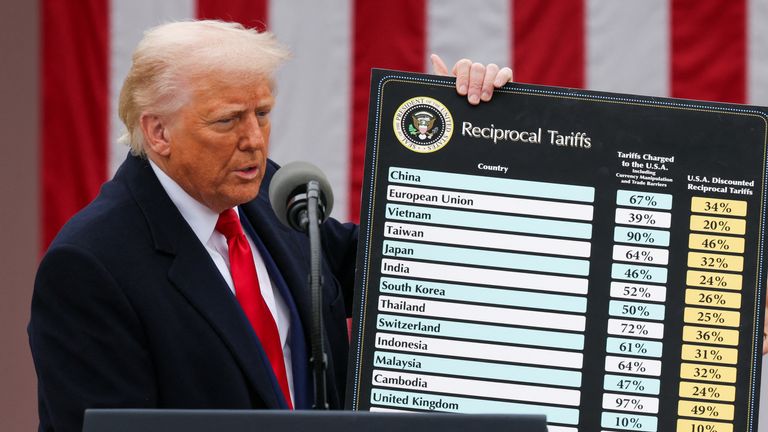Donald Trump’s tariffs will have consequences for globalisation, the US economy and geopolitics | Money News
For decades, trade and trade policy has been an economic and political backwater – decidedly boring, seemingly uncontroversial.
Trade was mostly free and getting freer, tariffs were getting lower and lower, and the world was becoming more, not less, globalised.
But alongside those long-term trends, there were some serious consequences.
Trump latest: US president announces sweeping global trade tariffs
Mature, developed economies like the UK and US became ever more reliant on cheap imports from China and, in the process, saw their manufacturing sectors shrink.
Large swathes of the rust belt in the US – and much of the Midlands and North of England – were hollowed out.
And to some extent that’s where the story of Donald Trump’s “Liberation Day” really began – with the notion that free trade and globalisation had a darker side, a side he wants to remedy via tariffs.
He imposed a set of tariffs in his first term, some on China, some on specific materials like steel and aluminium. But the height and the breadth of those tariffs were as nothing compared with the ones we have just heard about.
Not since the 1930s has the US so radically increased the level of tariffs on all nations across the world. Back then, those tariffs exacerbated the Great Depression.
It’s anyone’s guess as to what the consequences of these ones will be. But there will be consequences.
Consequences for the nature of globalisation, consequences for the US economy (tariffs are exceptionally inflationary), consequences for geopolitics.
And to some extent, merely knowing that little bit more about the White House’s plans will deliver a bit of relief to financial markets, which have fretted for months about the imposition of tariffs. That uncertainty recently reached unprecedented levels.
But don’t for a moment assume that this saga is over. Nothing of the sort. In the coming days, we will learn more – more about the nuts and bolts of these policies, more about the retaliatory measures coming from other countries.
We will, possibly, get more of a sense about whether some countries – including the UK – will enjoy reprieves from the tariffs.
To paraphrase Churchill, this isn’t the end of the trade war, or even the beginning of the end – perhaps just the end of the beginning.

